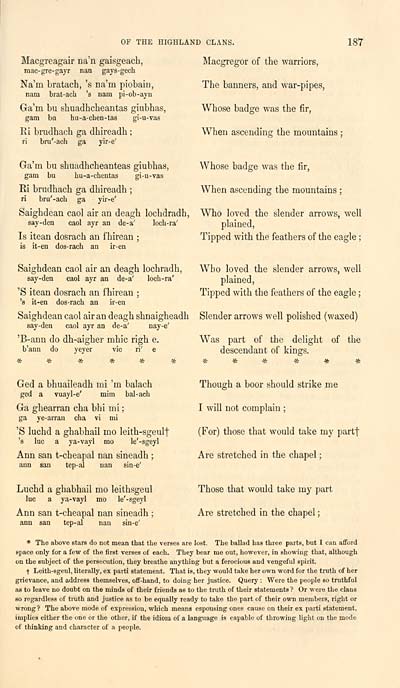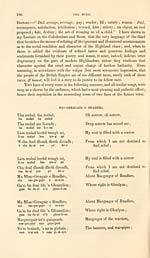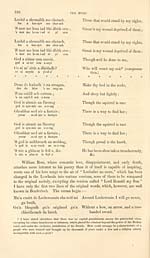Download files
Complete book:
Individual page:
Thumbnail gallery: Grid view | List view

Macgreagair na'n gaisgeach,
mac-gre-gayr nan gays-gech
Na'm bratach, 's na'm piobain,
nam brat-acU 's nam pi-ob-ayn
Ga'm bu shuadhcheantas giubhas,
gam bu hu-a-cben-tas gi-u-vas
Ri briidhach ga dhireadh ;
ri bru'-ach ga yir-e'
OF THE HIGHLAND CLANS.
Macgregor of the warriors,
The banners, and war-pipes,
Whose badge was the fir,
When ascending the mountains
187
Whose badge was the fir,
When ascending the mountains ;
Ga'm bu shuadhcheanteas giubhas,
gam bu hu-a-chentas gi-u-vas
Ri brndhach ga dhireadh ;
ri bru'-ach ga yir-e'
Saighdean caol air an deagh lochdradh. Who loved the slender arrows, well
say-den caol ayr an de-a' loch-ra' plained,
Is itean dosrach an f hirean ; Tipped with the feathers of the eagle ;
is it-en dos-raoh an ir-en
Saighdean caol air an deagh lochradh, Who loved the slender arrows, well
say-den caol ayr an de-a' loch-ra' plained
'S itean dosrach an fhirean ; Tipped with the feathers of the eagle ;
's it-en dos-rach an ir-en
Saighdean caol air an deagh shnaigheadh Slender arrows well polished (waxed)
say-den caol ayr an de-a' nay-e'
'B-ann do dh-aigher mhic righ e. Was part of the delight of the
b'ann do yeyer vie ri' e descendant of kings.
Ged a bhuaileadh mi 'm balach
ged a vuayl-e' mim bal-ach
Ga ghearran cha bhi mi ;
ga ye-arran cha vi mi
'S luchd a ghabhail mo leith-sgeulf
's luo a ya-vayl mo le'-sgeyl
Ann san t-cheapal nan sineadh ;
ann san tep-aj nan sin-e'
Luchd a ghabhail mo leithsgeul
luc a ya-vayl mo le'-sgeyl
Ann san t-cheapal nan sineadh ;
ann san tep-al nan sin-e'
Though a boor should strike me
I will not complain ;
(For) those that would take my partf
Are stretched in the chapel ;
Those that would take my part
Are stretched in the chapel ;
* The above stars do not mean that the verses are lost. The ballad has three parts, but I can afford
space only for a few of the first verses of each. They bear me out, however, in showing that, although
on the subject of the persecution, they breathe anything but a ferocious and vengeful spirit.
I Leith-sgeul, literally, ex parti statement. That is, they would take her own word for the truth of her
grievance, and address themselves, off-hand, to doing her justice. Query : Were the people so truthful
as to leave no doubt on the minds of their friends as to the truth of their statements ? Or were the clans
so regardless of truth and justice as to be equally ready to take the part of their own members, right or
wrong ? The above mode of expression, which means espousing ones cause on their ex parti statement,
implies either the one or the other, if the idiom of a language is capable of throwing light on the mode
of thinkÌDg and character of a people.
mac-gre-gayr nan gays-gech
Na'm bratach, 's na'm piobain,
nam brat-acU 's nam pi-ob-ayn
Ga'm bu shuadhcheantas giubhas,
gam bu hu-a-cben-tas gi-u-vas
Ri briidhach ga dhireadh ;
ri bru'-ach ga yir-e'
OF THE HIGHLAND CLANS.
Macgregor of the warriors,
The banners, and war-pipes,
Whose badge was the fir,
When ascending the mountains
187
Whose badge was the fir,
When ascending the mountains ;
Ga'm bu shuadhcheanteas giubhas,
gam bu hu-a-chentas gi-u-vas
Ri brndhach ga dhireadh ;
ri bru'-ach ga yir-e'
Saighdean caol air an deagh lochdradh. Who loved the slender arrows, well
say-den caol ayr an de-a' loch-ra' plained,
Is itean dosrach an f hirean ; Tipped with the feathers of the eagle ;
is it-en dos-raoh an ir-en
Saighdean caol air an deagh lochradh, Who loved the slender arrows, well
say-den caol ayr an de-a' loch-ra' plained
'S itean dosrach an fhirean ; Tipped with the feathers of the eagle ;
's it-en dos-rach an ir-en
Saighdean caol air an deagh shnaigheadh Slender arrows well polished (waxed)
say-den caol ayr an de-a' nay-e'
'B-ann do dh-aigher mhic righ e. Was part of the delight of the
b'ann do yeyer vie ri' e descendant of kings.
Ged a bhuaileadh mi 'm balach
ged a vuayl-e' mim bal-ach
Ga ghearran cha bhi mi ;
ga ye-arran cha vi mi
'S luchd a ghabhail mo leith-sgeulf
's luo a ya-vayl mo le'-sgeyl
Ann san t-cheapal nan sineadh ;
ann san tep-aj nan sin-e'
Luchd a ghabhail mo leithsgeul
luc a ya-vayl mo le'-sgeyl
Ann san t-cheapal nan sineadh ;
ann san tep-al nan sin-e'
Though a boor should strike me
I will not complain ;
(For) those that would take my partf
Are stretched in the chapel ;
Those that would take my part
Are stretched in the chapel ;
* The above stars do not mean that the verses are lost. The ballad has three parts, but I can afford
space only for a few of the first verses of each. They bear me out, however, in showing that, although
on the subject of the persecution, they breathe anything but a ferocious and vengeful spirit.
I Leith-sgeul, literally, ex parti statement. That is, they would take her own word for the truth of her
grievance, and address themselves, off-hand, to doing her justice. Query : Were the people so truthful
as to leave no doubt on the minds of their friends as to the truth of their statements ? Or were the clans
so regardless of truth and justice as to be equally ready to take the part of their own members, right or
wrong ? The above mode of expression, which means espousing ones cause on their ex parti statement,
implies either the one or the other, if the idiom of a language is capable of throwing light on the mode
of thinkÌDg and character of a people.
Set display mode to: Large image | Transcription
Images and transcriptions on this page, including medium image downloads, may be used under the Creative Commons Attribution 4.0 International Licence unless otherwise stated. ![]()
| Early Gaelic Book Collections > Blair Collection > Treatise on the language, poetry, and music of the Highland clans > (199) |
|---|
| Permanent URL | https://digital.nls.uk/76238592 |
|---|
| Description | A selection of books from a collection of more than 500 titles, mostly on religious and literary topics. Also includes some material dealing with other Celtic languages and societies. Collection created towards the end of the 19th century by Lady Evelyn Stewart Murray. |
|---|
| Description | Selected items from five 'Special and Named Printed Collections'. Includes books in Gaelic and other Celtic languages, works about the Gaels, their languages, literature, culture and history. |
|---|

